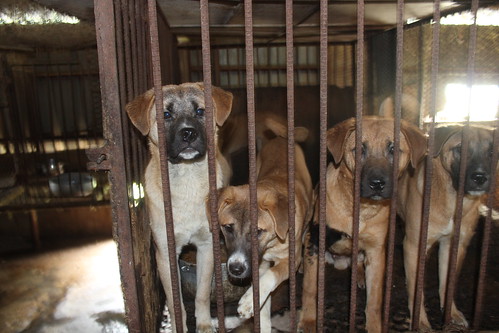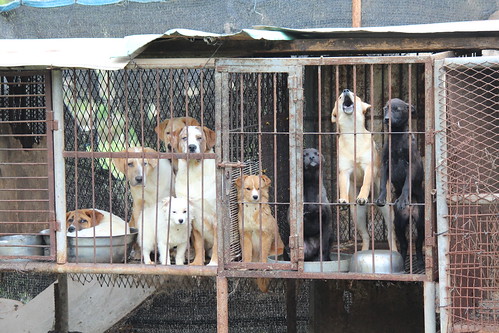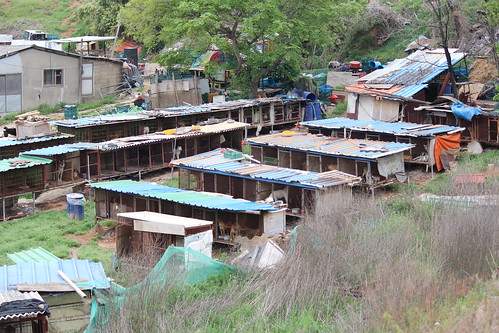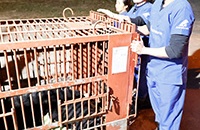How South Korea manages to “farm” dogs where others have failed - will shock you
16 July 2015

By Jill Robinson, founder and CEO of Animals Asia
It's an intriguing question as to how South Korea has managed to farm dogs for their meat when doing so has proved impossible elsewhere.
In fact, consistent failed attempts to farm dogs form the very basis of our calls not to regulate the industry, but to end dog meat consumption altogether.
From the outside, however, it might appear that South Korea has found a way to make it work. In truth their dog breeding for the meat industry is so far from humane - it’s at the very boundaries of what could even be considered farming.
Dogs are being bred by creating hellholes where every cost is shaved to a minimum with the dogs repeatedly the victim of each cut in costs.
In China, Animals Asia recently published the findings of our in-depth, four-year investigation into dog meat in 15 cities in eight provinces . We looked at how it is sourced, processed, and consumed. One point that was obvious throughout our investigations was that there is no such thing as a Chinese dog farming industry. The costs were too high - especially while illegal theft of companion animals remains a far cheaper supply.
Is South Korea really much better?
In discussion with Lola Webber, the co-founder of Change for Animals Foundation, we worked through the differences between China and South Korea and how the latter had achieved the “impossible” with large-scale dog breeding specifically for the meat market.
Firstly, South Korea is smaller in size and population than China. It has stronger laws that are upheld more rigorously. As a result, more people are willing to abide by them. There are fewer cases of stolen or lost dogs mysteriously disappearing.
Animals Asia has long referred to the dog meat industry being characterised by criminality and cruelty. In South Korea, the criminality is less evident but an increase in cruelty compensates.

This month sees the beginning of the three annual Bok Nal days in South Korea- Chobok, Jungbok, and Malbokat 10-day intervals across July and August. These are considered the hottest days of the lunar calendar when, thanks to a combination of tradition and cultural practice, dog meat consumption peaks. As the global spotlight turns to Korea, what does this “farming” look like?
The truth is it’s a horror show. The dogs are kept in cramped cages for their entire lives with zero care. They’re fed human food waste, sometimes other animals that may have died from diseases, even dead dogs. Breeders usually choose dog breeds like “yellow dogs” or “tosas” which have become considered “meat dogs” in South Korea. They are incredibly stoic and seem to be able to survive the most horrendous environments and still produce a lot of puppies twice a year.
These are then supplemented with pet industry “waste” - dogs that are either unsold or can no longer breed. They’re further added to by dogs once considered cherished pets but now no longer wanted.
South Korea has long been rabies free which is one less concern for the breeders. Beyond this farmers illegally inject their own dogs with vaccines from very dubious sources. In order to profit from them they only need to keep them alive a year. They frequently fail even that target, with mortality rates suggested as being between 10% and 40%.
Despite this “meat” being reared in such horrific circumstances it still commands a high price. A medium to large-scale tosa is likely to raise more than $250 wholesale, and a single bowl of boshingtang (dog meat stew) can cost $15.
The system defies logic and the belief that the dish will “balance the body’s heat” during the hot summer months is a marketing claim that cannot be backed up. The breeding of the dogs can barely be described as “farming”. Likewise the final cost does not reflect the quality of the goods. The meat industry is adept at marketing but no one could ever claim this was “grass-fed”, “organic” or even desirable.
As pet ownership rises rapidly and people’s tolerance for animal cruelty decreases, opinion polls show there is growing opposition from within South Korea and the call for an end is becoming louder. Via the Asia for Animals coalition we are adding our voice - as can you.
We know the health claims are dubious while the actual risks to health are not. Hong Kong, Taiwan, Singapore, Thailand and the Philippines have made dog meat eating illegal - largely because there is no humane way to breed dogs. Don’t be fooled by thinking South Korea has proved otherwise. This is sheer inexcusable exploitation.
Like local animal welfare groups in South Korea we want to see the Bok Nal days ended. But, more than that, we all want to see dog meat eating ended. Please help us. Sign the Asia for Animals Coalition petition.
BACK







 New year, new home for Christmas the Bear!
New year, new home for Christmas the Bear!
 Veterinary welfare training – pain management
Veterinary welfare training – pain management
 Feline Grimace Scale Training
Feline Grimace Scale Training